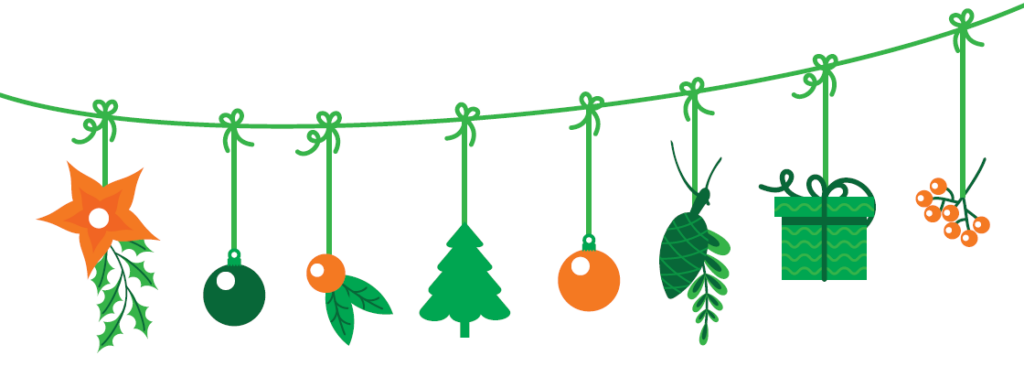Christmas waste
Cooking fat from meat
Congealed fat from ham or turkey can be put in the biowaste container or the home’s composter, packed inside a bag folded from newspaper or a paperboard package. The fat can also be put in the container for combustible waste, packed inside a plastic bottle or paperboard carton. This is where other leftovers from the Christmas table belong too, unless the property has a container for biowaste or a composter. Fat must not be poured down the drain or the toilet bowl, as it may cause blockages in the pipework. The skin from the meat and all other leftovers from the Christmas table belong in the biowaste container.
Cardboard and paperboard packaging
Cardboard and paperboard packaging can be put in the housing association’s or eco point’s container for paperboard packaging. Flatten packing boxes before putting them in the waste container. If the packaging is dirty, it must be put in the home’s container for combustible waste. Large clean cardboard boxes can be taken to a waste station’s cardboard container free of charge.
Plastic and styrofoam packaging
Plastic and styrofoam packaging can be deposited in the home’s waste container for combustible waste. Some municipal eco points also have collection containers for plastic packaging which belong to Finnish Packaging Recycling RINKI Ltd. Waste stations accept plastic and styrofoam as combustible waste free of charge.
New Year tin castings
New Year tin castings are classed as hazardous waste, because they contain lead. Hazardous waste is accepted at waste stations free of charge. Tin castings can also be recycled for use again next year or replaced entirely by using, for example, sugar or beeswax.
Grave candles
Grave candles in plastic casings are deposited in the home’s container for combustible waste, as are individual candles in glass casings. Larger volumes of candles in glass casings should be taken to a waste station’s glass waste container. Metal lanterns and the metal lids of grave candles are sorted into a container for metal waste.
Christmas trees
After Christmas, Etappi will collect your Christmas tree without a separate charge in connection with emptying your waste container. Leave the tree unpacked and in one piece next to the container or in the waste container shelter when you want us to collect it. Our free tree collection service is valid until the end of February, but it does not apply to artificial trees. Artificial trees must be taken to a waste station.
Bones
Small bones and fish bones belong in the biowaste container or composter. If you have neither, you can put them in the home’s container for combustible waste. A large ham or turkey bone belongs in the container for combustible waste.
Gift wrap and ribbons
Gift wrap and ribbons are classed as combustible waste which means that they are deposited in the home’s waste container for combustible waste. Gift wrap must not be put in the container for paper or paperboard, because it is heavily coated and contains a lot of ink, stickers and tape.
Foil dishes and the metal cups of tealights
These are deposited empty and clean in the housing association’s or eco point’s waste container for metal, as are other metal items. Small stearin residues in tealight cups are not a problem.
Christmas lights and LED candles
These are deposited in the container for domestic appliances and equipment at a waste station free of charge, as are other small and large electrical appliances from households. Please remove any batteries and detachable light bulbs and sort them appropriately.
Fireworks
Unused, dud and misfired fireworks are returned to the seller or importer. The rubbish re
sulting from used fireworks can be put in the container for combustible waste.
Christmas plants and spruce wreaths

Spruce wreaths and plant parts from Christmas plants belong in the container for biowaste or combustible waste. Soil does not belong in the biowaste container. Instead one flowerpot-full of it can be deposited in the home’s container for combustible waste. Larger volumes of soil that do not exceed 20 litres are accepted at waste stations along with raking waste free of charge.


